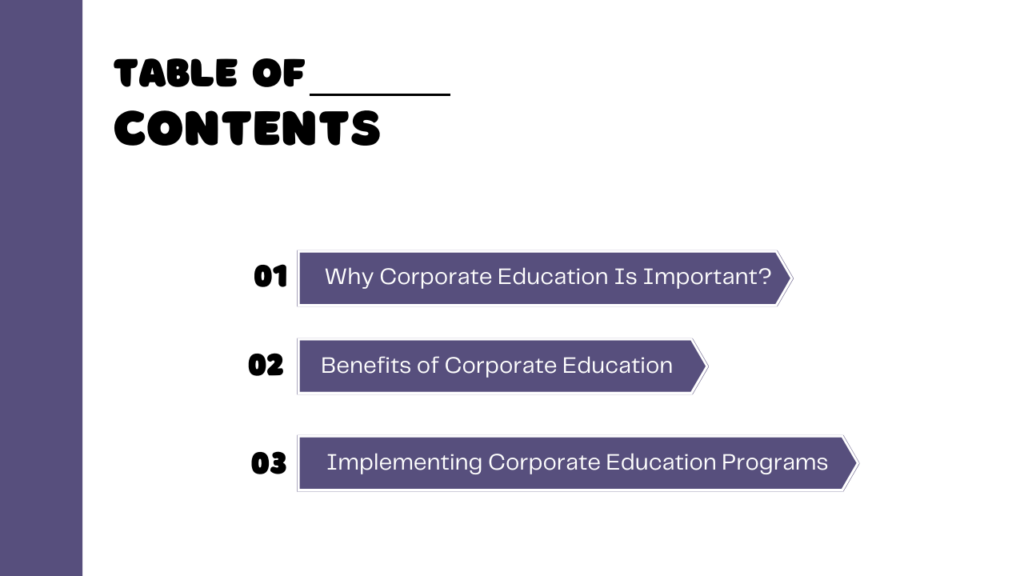In today’s competitive business landscape, organizations are constantly looking for ways to improve employee performance, engagement, and retention.
One effective strategy that has gained significant traction in recent years is corporate education.
Workforce education refers to the intentional and systematic efforts of organizations to provide learning and development opportunities to their employees, with the goal of enhancing their skills, knowledge, and overall job performance.
In this article, we will explore how corporate education can enhance employee experience and the key considerations for implementing successful corporate education programs in the workplace.

1. Why Corporate Education is Important
Workforce education has emerged as a critical component of talent development and management strategies for organizations seeking to stay ahead of the competition. With the rapid pace of technological advancements and changing business landscapes, continuous learning and upskilling have become essential for employees to remain relevant and effective in their roles.
As such, organizations are increasingly recognizing the need to invest in corporate education programs to equip their employees with the necessary skills and knowledge to excel in their jobs and contribute to the overall success of the organization.
2. Benefits of Corporate Education
A well-designed and implemented Workforce education program can yield a multitude of benefits for both employees and organizations. Some of the key benefits include:
Improved Job Performance:
Workforce education programs provide employees with the opportunity to learn new skills, acquire knowledge, and develop expertise in their respective fields. This can result in improved job performance as employees become more competent and confident in their roles.
With increased knowledge and skills, employees are better equipped to handle job challenges, make informed decisions, and deliver results, ultimately contributing to the success of the organization.
Increased Job Satisfaction:
When employees feel supported in their professional growth and development through corporate education programs, it can lead to increased job satisfaction. Employees appreciate the investment made by their organization in their learning and development, which can result in higher levels of engagement, motivation, and commitment to their work.
Additionally, corporate education programs can provide employees with a sense of purpose and fulfillment, as they see tangible progress in their skills and knowledge, which can positively impact their overall job satisfaction.
Professional Growth and Development:
Corporate education programs offer employees opportunities for professional growth and development. By acquiring new skills, knowledge, and certifications, employees can broaden their career prospects, increase their marketability, and position themselves for advancement within the organization.
This can result in higher employee retention rates, as employees feel valued and motivated to stay with the organization that invests in their growth and development.
Enhanced Employee Retention:
Employee retention is a key concern for organizations, as turnover can be costly and disruptive. Corporate education programs can play a vital role in employee retention, as they provide employees with opportunities to continuously learn, grow, and advance their careers within the organization.
Employees who feel supported in their career growth are more likely to stay with the organization and contribute to its success over the long term.
3. Implementing Corporate Education Programs
While the benefits of corporate education are clear, implementing successful corporate education programs requires careful planning, design, and execution. Here are some key considerations for organizations looking to implement effective corporate education programs:
Identifying Employee Training Needs:
The first step in designing a successful corporate education program is to identify the training needs of employees. This can be done through various methods such as surveys, assessments, performance evaluations, and feedback from managers and employees themselves.
Identifying the specific skills, knowledge, and competencies that employees need to excel in their roles is critical to designing relevant and effective corporate education programs.
Developing Training Programs:
Once the training needs are identified, organizations can develop training programs that are aligned with the identified needs. Training programs can take various forms, including workshops, seminars, webinars, e-learning modules, on-the-job training, mentoring, coaching, and certification programs.
Wrap Up
Workforce education is a powerful tool that can enhance employee experience and contribute to the success of an organization. By providing employees with opportunities to continuously learn, grow, and develop their skills, organizations can improve job performance, increase job satisfaction, enhance employee retention, and foster a culture of continuous improvement.
Investing in corporate education is not only beneficial for employees, but also for the organization as a whole, as it can lead to improved performance, increased productivity, and a competitive edge in the market.

